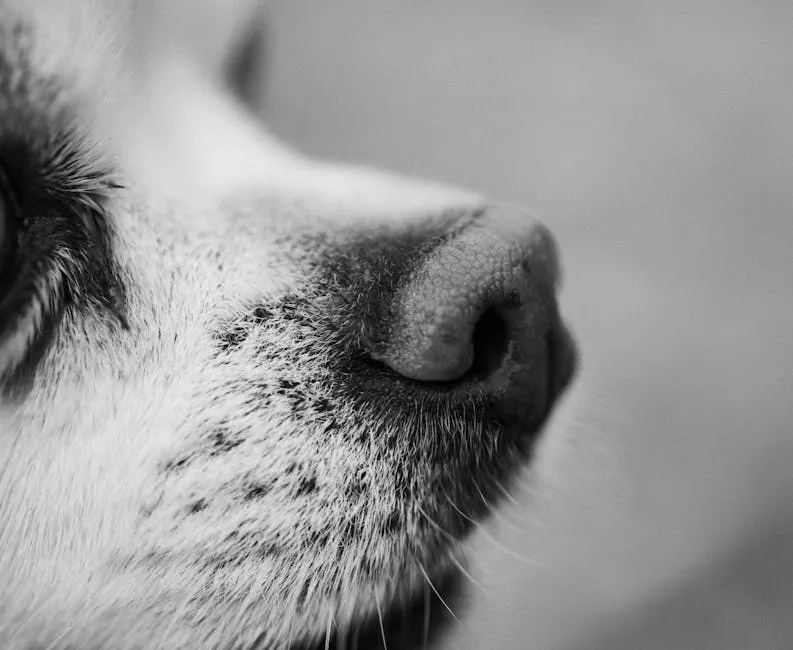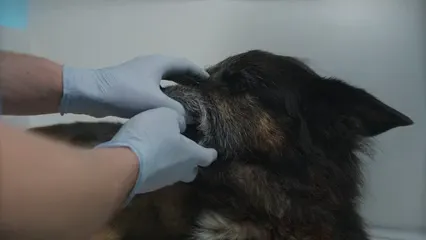
Why Is My Dog’s Nose Running? Understanding Causes and Solutions
Introduction
Is your dog’s nose running? You’re not alone! Many pet owners notice this common occurrence. While a runny nose might seem harmless, it can hint at more serious health issues. Understanding the causes is crucial for providing the best care for your furry friend. Let’s explore why your dog’s nose may be running and what it could mean for their health.
To help your dog find relief from allergies, consider using Dog Allergy Relief Antihistamine Tablets. They can help alleviate the discomfort caused by environmental triggers like pollen and dust, ensuring your pup can enjoy the great outdoors without constantly sneezing!

Summary and Overview
A runny nose in dogs, also known as nasal discharge, can vary in appearance. Normal discharge is typically clear and watery. However, abnormal discharge may appear yellow, green, or have a foul smell. Monitoring the type and color of the discharge is important. Accompanying symptoms, like coughing or lethargy, can indicate underlying health concerns.
Common causes of a runny nose include allergies, infections, and dental problems. If your dog’s runny nose persists or worsens, it’s wise to consult your veterinarian. Allergies can lead to discomfort, while infections may require prompt treatment. Understanding these factors can help ensure your dog remains happy and healthy. For more on infections, check out this article on why do I keep getting yeast infections.

Understanding the impact of infections is vital for your dog’s health. Learn more about infections here.
Common Causes of a Runny Nose in Dogs
Allergies
Allergies are frequent culprits behind a dog’s runny nose. Environmental factors like pollen, dust mites, and mold can trigger these reactions. Additionally, some dogs may react to certain foods. If your pup is suffering from allergies, you might notice sneezing, itching, or watery eyes alongside the nasal discharge. Treatment often involves antihistamines or avoiding the allergens. Consulting your vet can help identify specific triggers and appropriate medications.
To make feeding your dog easier, consider investing in a PetSafe Healthy Pet Simply Feed Automatic Dog Feeder. This feeder allows you to schedule meals for your furry friend, helping to maintain a consistent diet, which is essential for managing allergies.

Infections
Infections can also lead to nasal discharge in dogs. These can be viral, bacterial, or fungal. Common infections include kennel cough and canine influenza. Each type presents with distinct symptoms. Viral infections may show mild signs, while bacterial ones often cause thicker, discolored mucus. If your dog has a runny nose with a foul odor, it’s crucial to seek veterinary care for proper diagnosis and treatment. Antibiotics or antifungals might be necessary, depending on the infection type.
Foreign Objects
Dogs are naturally curious and often sniff around, which can lead to foreign objects getting stuck in their noses. This can cause nasal blockage and discharge. Look for signs like pawing at the nose, sneezing, or retching. If you suspect something is lodged, it’s best to consult your vet. They can safely remove the object and provide any necessary follow-up care.
Dental Problems
Believe it or not, dental issues can contribute to a runny nose. Periodontal disease often leads to nasal discharge due to the close connection between the mouth and nasal passages. Signs of dental problems include bad breath and facial swelling. Regular dental cleanings and proper oral care can prevent these issues. If dental disease is present, your vet may recommend extractions or other treatments to restore your dog’s health.
To maintain your dog’s dental hygiene, consider a Dog Toothbrush Kit. Regular brushing can help prevent dental problems that may lead to nasal issues!

Nasal Polyps or Tumors
Nasal polyps and tumors can cause unusual nasal discharge in dogs. These growths may block airways and lead to persistent discharge. If you notice your dog sneezing frequently or experiencing weight loss, these could be signs of a more serious issue. In some cases, the discharge may have a foul odor or contain blood.
Treatment often requires surgical intervention to remove these growths. Early detection is key, as this can significantly impact your dog’s recovery. Regular veterinary check-ups can help identify these conditions before they become serious.

Environmental Irritants
Many common household items can irritate your dog’s nasal passages. Dust, smoke, and cleaning products are frequent offenders. If your dog is exposed to these irritants, they may develop mild nasal discharge and sneezing.
Reducing exposure to these irritants is essential for your dog’s comfort. Switching to pet-safe cleaning products or ensuring adequate ventilation can make a difference. If symptoms persist, consult your veterinarian for further advice.

Breed-Specific Issues
Certain breeds, especially brachycephalic types like Bulldogs and Pugs, are prone to nasal problems. These dogs often have anatomical features that lead to breathing issues. Symptoms can include loud breathing and snoring, which can be concerning if persistent.
In severe cases, surgical correction may be necessary to improve airflow. If you own a breed that’s susceptible to these issues, regular vet visits are crucial to monitor their nasal health.

Cleft Palate or Fistula
Cleft palates and fistulas are congenital conditions that can lead to nasal discharge. Dogs with these issues may experience nasal discharge after eating or drinking. This happens because food or liquid can enter the nasal passage, causing irritation.
Surgical intervention is typically required for these conditions. Early diagnosis can help improve your dog’s quality of life and prevent further complications. If you suspect your dog has these issues, consult your veterinarian promptly.
Accompanying Symptoms and What They Might Mean
When your dog’s nose is running, it’s crucial to observe any additional symptoms. Some signs may require immediate veterinary attention.
Discolored or foul-smelling discharge can indicate infections or serious health issues. Clear discharge is often less concerning, but yellow or green mucus should not be ignored.
Persistent coughing or sneezing can signal respiratory infections or allergies. If your dog is coughing frequently, it’s time to consult your vet.
Lethargy and appetite loss are also serious red flags. If your dog seems unusually tired or refuses to eat, seek veterinary care promptly. These symptoms might suggest underlying conditions that need addressing.

Recognizing these signs early can lead to quicker diagnosis and treatment, ensuring your furry friend stays healthy and happy. Consider using a Pet First Aid Kit at home to be prepared for any unexpected situations!
Diagnosis and Treatment Options
Diagnosis
Diagnosing the cause of a runny nose in dogs involves a thorough physical examination and a detailed history of your pet’s symptoms. Your vet may ask about recent activities, such as visits to parks or kennels.
Diagnostic tests can include X-rays or rhinoscopy, which allows for direct observation of the nasal passages. These steps are essential to identify the underlying cause and tailor effective treatment.

Treatment
Treatment will depend on the identified cause of the runny nose.
- Antibiotics are typically prescribed for bacterial infections.
- Antihistamines may help alleviate symptoms related to allergies.
- If a foreign body or tumor is present, surgery might be necessary for removal.
Regular veterinary check-ups are vital for maintaining your dog’s health. They help catch potential issues early and keep your pet feeling their best. You may also want to consider using a Dog Water Bottle with Bowl for hydration during your vet visits or outdoor adventures!

Home Care and Prevention
Noticing a mild runny nose in your dog? Here are some tips to help manage it at home. First, monitor the discharge closely. If it remains clear and your dog seems healthy, you can keep an eye on it. However, if it changes color or consistency, that’s a sign to consult your vet.
Hydration is key. Ensure your dog drinks plenty of fresh water. Staying hydrated helps thin mucus and keeps your pup comfortable. Also, maintain a clean environment. Regularly clean your dog’s bedding and living area to minimize allergens and irritants.

Preventive care is essential. Ensure your dog is up-to-date on vaccinations. Vaccines can help protect against illnesses that may cause a runny nose. Additionally, try to avoid known allergens. Keep your dog away from known irritants like pollen, dust, and certain cleaning products. This proactive approach can help reduce the frequency of nasal issues.
For added comfort, consider a Dog Bed Orthopedic Memory Foam to provide extra support for your dog’s joints, especially if they are feeling under the weather!

Conclusion
Understanding why your dog’s nose is running is crucial for their health. A runny nose can be a sign of allergies, infections, or other health conditions. By monitoring symptoms closely, you can catch potential issues early. If symptoms worsen or persist, seek veterinary care. Remember, with proper care and attention, many causes of a runny nose can be effectively managed. Keep your furry friend happy and healthy!
FAQs
Is a runny nose in dogs always a cause for concern?
A mild runny nose can be normal. However, if it persists or changes color, it may require attention.
What should I do if my dog’s nose is running excessively?
Monitor your dog closely. If the discharge worsens, consult your vet. Home remedies like steam or a humidifier may help temporarily.
How can I tell if my dog has allergies?
Look for symptoms like itching, sneezing, or watery eyes. Allergy testing by your vet can confirm specific triggers.
Can a runny nose be a sign of something serious?
Yes, especially if accompanied by symptoms like lethargy or discolored discharge. Consult your vet for any concerning signs.
What are the best ways to prevent nasal issues in dogs?
Keep vaccinations current, avoid allergens, and maintain good dental health. Regular vet check-ups are also important.
When should I take my dog to the vet for a runny nose?
If the runny nose persists for more than a few days, or if there are concerning symptoms like fever, coughing, or appetite loss, it’s time for a vet visit.
Please let us know what you think about our content by leaving a comment down below!
Thank you for reading till here 🙂
And while you’re here, check out a fun way to bond with your dog using Dog Training Clicker! It’s a great tool for teaching tricks and reinforcing positive behavior.
All images from Pexels




